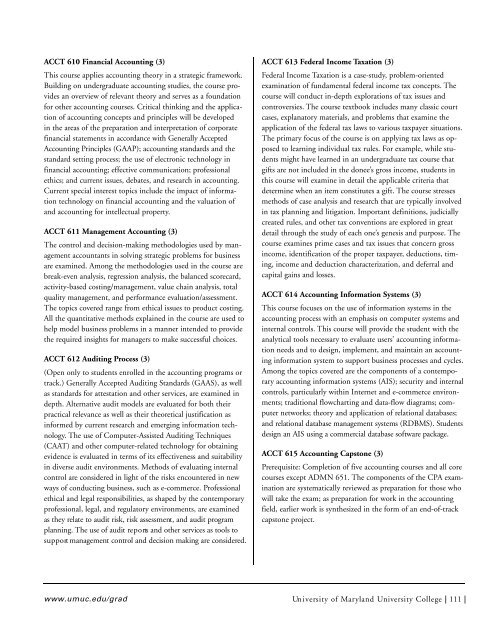A+B. Intro_SJ.1 - University of Maryland University College
A+B. Intro_SJ.1 - University of Maryland University College
A+B. Intro_SJ.1 - University of Maryland University College
You also want an ePaper? Increase the reach of your titles
YUMPU automatically turns print PDFs into web optimized ePapers that Google loves.
ACCT 610 Financial Accounting (3)<br />
This course applies accounting theory in a strategic framework.<br />
Building on undergraduate accounting studies, the course provides<br />
an overview <strong>of</strong> relevant theory and serves as a foundation<br />
for other accounting courses. Critical thinking and the application<br />
<strong>of</strong> accounting concepts and principles will be developed<br />
in the areas <strong>of</strong> the preparation and interpretation <strong>of</strong> corporate<br />
financial statements in a c c o rdance with Generally Ac c e p t e d<br />
Accounting Principles (GAAP); accounting standards and the<br />
standard setting process; the use <strong>of</strong> electronic technology in<br />
financial accounting; effective communication; pr<strong>of</strong>essional<br />
ethics; and current issues, debates, and research in accounting.<br />
Current special interest topics include the impact <strong>of</strong> information<br />
technology on financial accounting and the valuation <strong>of</strong><br />
and accounting for intellectual property.<br />
ACCT 611 Management Accounting (3)<br />
The control and decision-making methodologies used by management<br />
accountants in solving strategic problems for business<br />
are examined. Among the methodologies used in the course are<br />
break-even analysis, regression analysis, the balanced scorecard,<br />
activity-based costing/management, value chain analysis, total<br />
quality management, and performance evaluation/assessment.<br />
The topics covered range from ethical issues to product costing.<br />
All the quantitative methods explained in the course are used to<br />
help model business problems in a manner intended to provide<br />
the required insights for managers to make successful choices.<br />
ACCT 612 Auditing Process (3)<br />
(Open only to students enrolled in the accounting programs or<br />
track.) Generally Accepted Auditing Standards (GAAS), as well<br />
as standards for attestation and other services, are examined in<br />
depth. Alternative audit models are evaluated for both their<br />
practical relevance as well as their theoretical justification as<br />
informed by current research and emerging information technology.<br />
The use <strong>of</strong> Computer-Assisted Auditing Techniques<br />
(CAAT) and other computer-related technology for obtaining<br />
evidence is evaluated in terms <strong>of</strong> its effectiveness and suitability<br />
in diverse audit environments. Methods <strong>of</strong> evaluating internal<br />
control are considered in light <strong>of</strong> the risks encountered in new<br />
ways <strong>of</strong> conducting business, such as e-commerce. Pr<strong>of</strong>essional<br />
ethical and legal responsibilities, as shaped by the contemporary<br />
pr<strong>of</strong>essional, legal, and regulatory environments, are examined<br />
as they relate to audit risk, risk assessment, and audit pro g r a m<br />
planning. The use <strong>of</strong> audit re p o rts and other services as tools to<br />
s u p p o rt management control and decision making are considere d .<br />
ACCT 613 Federal Income Taxation (3)<br />
Federal Income Taxation is a case-study, problem-oriented<br />
examination <strong>of</strong> fundamental federal income tax concepts. The<br />
course will conduct in-depth explorations <strong>of</strong> tax issues and<br />
controversies. The course textbook includes many classic court<br />
cases, explanatory materials, and problems that examine the<br />
application <strong>of</strong> the federal tax laws to various taxpayer situations.<br />
The primary focus <strong>of</strong> the course is on applying tax laws as opposed<br />
to learning individual tax rules. For example, while students<br />
might have learned in an undergraduate tax course that<br />
gifts are not included in the donee’s gross income, students in<br />
this course will examine in detail the applicable criteria that<br />
determine when an item constitutes a gift. The course stresses<br />
methods <strong>of</strong> case analysis and research that are typically involved<br />
in tax planning and litigation. Important definitions, judicially<br />
created rules, and other tax conventions are explored in great<br />
detail through the study <strong>of</strong> each one’s genesis and purpose. The<br />
course examines prime cases and tax issues that concern gross<br />
income, identification <strong>of</strong> the proper taxpayer, deductions, timing,<br />
income and deduction characterization, and deferral and<br />
capital gains and losses.<br />
ACCT 614 Accounting Information Systems (3)<br />
This course focuses on the use <strong>of</strong> information systems in the<br />
accounting process with an emphasis on computer systems and<br />
internal controls. This course will provide the student with the<br />
analytical tools necessary to evaluate users’ accounting information<br />
needs and to design, implement, and maintain an accounting<br />
information system to support business processes and cycles.<br />
Among the topics covered are the components <strong>of</strong> a contemporary<br />
accounting information systems (AIS); security and internal<br />
controls, particularly within Internet and e-commerce environments;<br />
traditional flowcharting and data-flow diagrams; computer<br />
networks; theory and application <strong>of</strong> relational databases;<br />
and relational database management systems (RDBMS). St u d e n t s<br />
design an AIS using a commercial database s<strong>of</strong>tware package.<br />
ACCT 615 Accounting Capstone (3)<br />
Prerequisite: Completion <strong>of</strong> five accounting courses and all core<br />
courses except ADMN 651. The components <strong>of</strong> the CPA examination<br />
are systematically reviewed as preparation for those who<br />
will take the exam; as preparation for work in the accounting<br />
field, earlier work is synthesized in the form <strong>of</strong> an end-<strong>of</strong>-track<br />
capstone project.<br />
w w w. u m u c . e d u / g r a d<br />
Un i versity <strong>of</strong> Ma r yland Un i versity <strong>College</strong> | 111 |

















